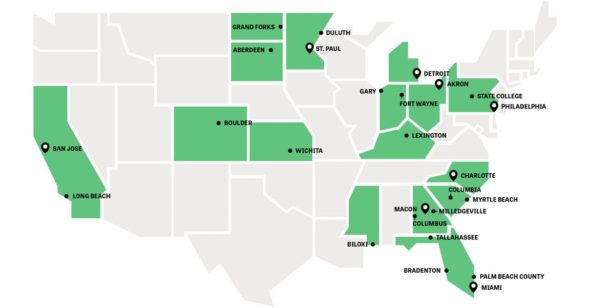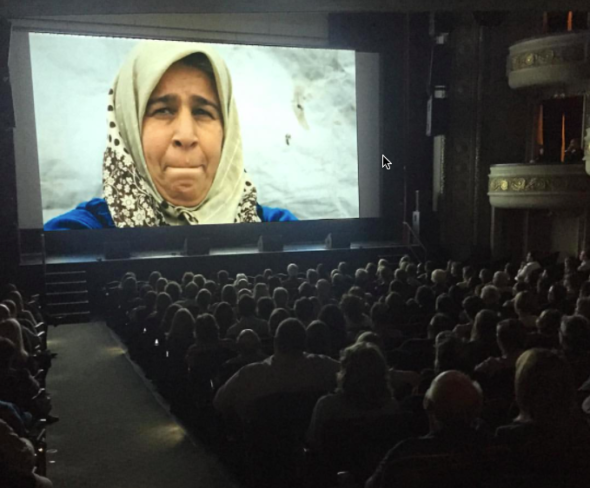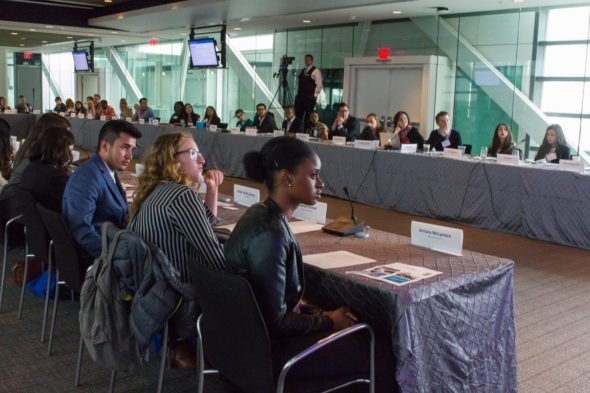Knight Foundation is a national non-profit foundation and a Submittable client. Their work supports technological innovation, the arts, community development, and journalism. In January, we interviewed George Abbott.
Please describe your role at the Knight Foundation and how it intersects with grants.
I work on the community and national initiatives team at the Knight Foundation. I manage the Knight Cities Challenge, our annual 5 million-dollar open call for ideas to make the 26 cities we work in more successful. I also work with program directors in the communities where Knight invests and other staff departments on Knight initiatives that involve our city-focused work. In addition, I often help identify and work with outside experts to advise on specific opportunities or challenges in Knight cities.
What makes the Knight Foundation unique? What should people being exposed to you for the first time know?
Our mission is to build more informed and engaged communities. Our founders believe that this goal was key to building a stronger democracy. We’re unique in that we’re a national foundation, but we have deep local roots in the 26 cities where the Knight brothers owned newspapers. We operationalize our strategy across four portfolios: journalism, technology innovation, communities, and the arts. While distinct in nature, each of these areas function and intersect to build community and advance the foundation’s mission.

Knight Foundation serves 26 communities.
Where does Knight Foundation funding come from and how much do you award?
The funding comes from our endowment – currently around $2.1 billion; we use the interest from the endowment to support our programs and activities. Depending on how the market goes, we usually disperse between $110 million and $120 million in a given year.
Can you give us an example of a recent project you funded through the Cities Challenge?
One of our most successful Knight Cities Challenge project is the Pop-Up Pool Project in Philadelphia, a winner in 2015. Philadelphia actually has more public pools than anywhere in the country apart from New York. The challenge applicant saw these spaces as a missed opportunity, used mainly by kids and lacking a diverse contingent of supporters. This project helped spark the revitalization of public pools into vibrant civic spaces.
The successful transformation of one pool got the city’s attention The project opened their mind to the potential of public pools to break down barriers between people of different backgrounds and income levels, and provide a neighborhood meeting place ripe for engagement. The project won $297,000 through the Cities Challenge; the city then took on the funding of the project and expanded it to five sites. They rebranded as Swim Philly and they’ll be expanding again in 2017. Importantly, the Pop-Up Pool Project help shift the mindset of city staff and encouraged them to think about doing things in a new way.
What’s the hardest part of your job?
Making tough decisions – we get many requests for funding, and there are so many good programs but we are only able to support a relatively small number of them.

The Arab Film Fest in St. Paul was a Knight Arts Challenge winner.
Over three years of the Knight Cities Challenge, we have received more than 16,500 applications. In the first two years we funded fewer than 70 projects. We’ll announce this year’s winners in Spring/Summer. I expect we will fund between 25 and 40 projects.
The hardest thing is having to say no.
What are the most important factors for making these decisions?
For the Cities Challenge, it goes back to what we’re really seeking to do. It’s our place to find innovation and new ideas – we’re able to provide risk capital so that people can try something out and if it works, great. You have proof that it works. Projects can take that proof to future investors, who are probably less risk-tolerant.
Our philosophy is focused on making our cities vibrant. Place-focused projects are very important – design of place, the programming, civic access, programs like that. However, an application showing just why something should happen is not necessarily enough. Innovation is the most essential factor.

Sensors in a Shoebox is a youth-dedicated data initiative that won the Cities Challenge.
The initial application for both the Arts and Cities Challenges requires less than 300 words. What is the logic behind this?
We believe that good ideas can come from anywhere and anyone so we want to make it as easy as possible for anyone to apply. The initial application is very easy and we’re just looking for good, powerful ideas. We select finalists and they need to submit full applications.
What are the most important goals behind The Knight Foundation?
We believe that informed and engaged communities are crucial to a strong democracy. Our core beliefs are:
- We believe in freedom of expression and the first amendment.
- We believe that an informed citizenry is crucial for individuals and communities to make their own best decisions, and that journalism has a critical role to play in that process.
- We believe in equitable, inclusive and participatory communities.
Our grant-making seeks to support these beliefs but we have individual distinct strategies within each portfolio.

Students discuss First Amendment rights at a conference sponsored by the Newseum Institute and Knight Foundation. Photo (cc) by Mark Schierbecker on Flickr.
Any concerns about how the current administration may impact the Foundation?
Our core principles remain constant no matter who is in the White House.
How do you see the grants world changing?
The saying goes that once you know a foundation, you know a foundation. Every foundation is so different. A lot of it comes down to individuals. The same foundation can operate very differently with different people in the same place — people can’t help but bring in their own point of view.
I’d say generally across the field, you see more of a focus on equity and inclusion. Lots of people are doing that in different ways. Ford Foundation is focusing on equity, and you see it being woven into many other foundations as well.
The knock on foundations has been that they prioritize project-based funding instead of offering general support – you’re starting to see more foundations recognize this by offering general support.
It remains to be seen how long those trends will last.
What impact do you think Knight grants can have on the world?
I see the Knight Foundation’s role as a catalytic funder. With the cities challenge we look for innovation and seek to provide risk capital for people to try new ideas. The bet is that if they’re successful they now have a track record of success to demonstrate to other funders — or they have managed to build a sustaining operation.
The Arts Challenge seeks to make art more common in the cities where it operates. We think art is essential to city identity. The challenge’s unique structure mines for the best arts ideas from and for the community. The challenge is an example of dynamic grant making, guided by foundation strategy but heavily informed by local contexts.
This program is not representative of grant making as a whole. Its open structure, low barriers to entry, and focus on artistic excellence and authenticity make it distinct amongst its counterparts.
What’s the best thing about your job?
The best thing is that I get to find really smart people with good ideas and give them the resources to execute their ideas, ideas that improve cities.
 George Abbott is the Director of Community and National Initiatives for the Knight Foundation. He joined Knight Foundation in September 2013 as special assistant to the VP/Community and National Initiatives. Previously, Abbott worked in communications at ArtPlace America, a funding collaborative working to accelerate creative placemaking across the United States. Abbott worked on the 2013 presidential inauguration and as an organizer on President Obama’s 2012 reelection campaign. He is an author with numerous published works, including The Economics Book (Dorling Kindersley). Abbott grew up in Europe, spending time in England and across the continent. He holds a bachelor’s degree from Newcastle University.
George Abbott is the Director of Community and National Initiatives for the Knight Foundation. He joined Knight Foundation in September 2013 as special assistant to the VP/Community and National Initiatives. Previously, Abbott worked in communications at ArtPlace America, a funding collaborative working to accelerate creative placemaking across the United States. Abbott worked on the 2013 presidential inauguration and as an organizer on President Obama’s 2012 reelection campaign. He is an author with numerous published works, including The Economics Book (Dorling Kindersley). Abbott grew up in Europe, spending time in England and across the continent. He holds a bachelor’s degree from Newcastle University.
